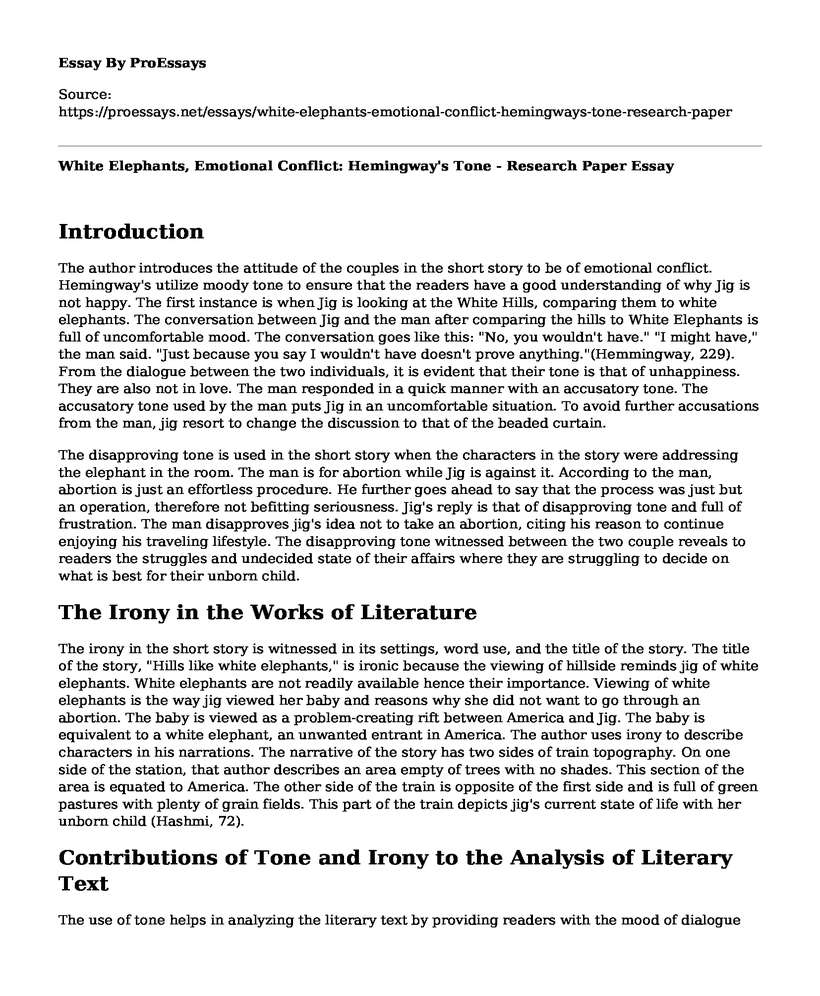Introduction
The author introduces the attitude of the couples in the short story to be of emotional conflict. Hemingway's utilize moody tone to ensure that the readers have a good understanding of why Jig is not happy. The first instance is when Jig is looking at the White Hills, comparing them to white elephants. The conversation between Jig and the man after comparing the hills to White Elephants is full of uncomfortable mood. The conversation goes like this: "No, you wouldn't have." "I might have," the man said. "Just because you say I wouldn't have doesn't prove anything."(Hemmingway, 229). From the dialogue between the two individuals, it is evident that their tone is that of unhappiness. They are also not in love. The man responded in a quick manner with an accusatory tone. The accusatory tone used by the man puts Jig in an uncomfortable situation. To avoid further accusations from the man, jig resort to change the discussion to that of the beaded curtain.
The disapproving tone is used in the short story when the characters in the story were addressing the elephant in the room. The man is for abortion while Jig is against it. According to the man, abortion is just an effortless procedure. He further goes ahead to say that the process was just but an operation, therefore not befitting seriousness. Jig's reply is that of disapproving tone and full of frustration. The man disapproves jig's idea not to take an abortion, citing his reason to continue enjoying his traveling lifestyle. The disapproving tone witnessed between the two couple reveals to readers the struggles and undecided state of their affairs where they are struggling to decide on what is best for their unborn child.
The Irony in the Works of Literature
The irony in the short story is witnessed in its settings, word use, and the title of the story. The title of the story, "Hills like white elephants," is ironic because the viewing of hillside reminds jig of white elephants. White elephants are not readily available hence their importance. Viewing of white elephants is the way jig viewed her baby and reasons why she did not want to go through an abortion. The baby is viewed as a problem-creating rift between America and Jig. The baby is equivalent to a white elephant, an unwanted entrant in America. The author uses irony to describe characters in his narrations. The narrative of the story has two sides of train topography. On one side of the station, that author describes an area empty of trees with no shades. This section of the area is equated to America. The other side of the train is opposite of the first side and is full of green pastures with plenty of grain fields. This part of the train depicts jig's current state of life with her unborn child (Hashmi, 72).
Contributions of Tone and Irony to the Analysis of Literary Text
The use of tone helps in analyzing the literary text by providing readers with the mood of dialogue that existed between the man and jig. It provides a revelation of the elephant in the room that is abortion and why the two do not agree on the next step to take. The tone provides an insight as to why the two do not yet have a solution to their problem. The irony, on the other hand, helps in strengthening Hemmingway's ideas of the story. The ironic situations in the story create a clear description of narratives found in the text (O'Brien, 23).
Works Cited
Hashmi, Nilofer. "Hills Like White Elephants": The Jilting of Jig." The Hemingway Review 23.1 (2003): 72-83.
Hemingway, Ernest. "Hills like white elephants." Men without women (1927): 229-31.
O'Brien, Timothy D. "ALLUSION, WORD. PLAY, AND THE CENTRAL CONFLICT." The Hemingway Review 12.1 (1992).
Cite this page
White Elephants, Emotional Conflict: Hemingway's Tone - Research Paper. (2023, Mar 10). Retrieved from https://proessays.net/essays/white-elephants-emotional-conflict-hemingways-tone-research-paper
If you are the original author of this essay and no longer wish to have it published on the ProEssays website, please click below to request its removal:
- Literary Analysis Essay on As You Like It
- Chinese Mythology Essay Example
- Essay on I Hear America Singing: Comparing Walt Whitman and Langston Hughes
- Essay Sample on The Great Gatsby: A Modernist Tale of the Jazz Era's Downfall
- Literary Analysis Essay on "Everyday Use" and "Dead Men's Path"
- Women's Sickness: Impact of Fundamental Family Levels on Emotions - Essay Sample
- Book Review Sample on Rappaccini's Daughter: Complete Spectrum of Human Morality







